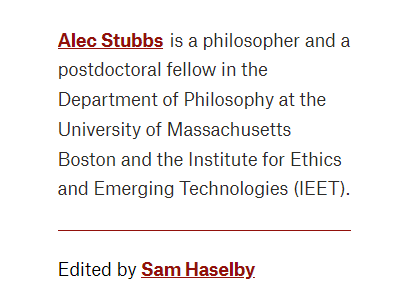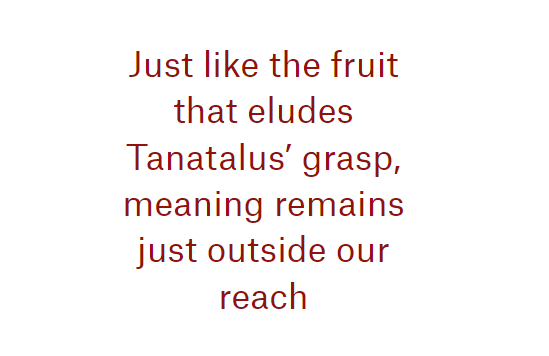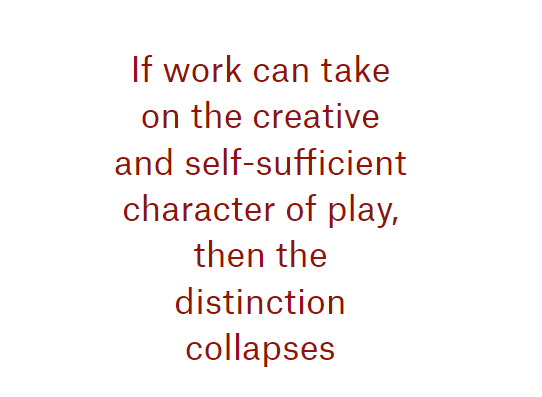The achievement society is burning us out, we need more play

This is about more than a self-help switch – it will take structural changes to reject capitalism’s productivity obsession
https://psyche.co/ideas/the-achievement-society-is-burning-us-out-we-need-more-play


We are obsessed with work. It shapes our identities, gives our lives structure, and guides us towards our purpose in life. As Americans, work is who we are. We believe that our achievements and productivity not only define us but also pave the way for success and happiness. For the Korean German philosopher Byung-Chul Han, contemporary capitalist society has become an ‘achievement society’ and we, as its subjects, have become ‘achievement-subjects’. In the achievement society, we suffer from an internalised pressure to achieve – to do more, to be more, to have more. Whether we are aware of it or not, we have internalised the capitalist work ethic to the degree that our successes and failures weigh heavily on our individual shoulders. The primary result of the achievement society is burnout – the emotional, cognitive and physical exhaustion that comes from the pressure to constantly achieve. And so, for Han, in the contemporary world, the self is no longer a subject but a project. The self is something to be optimised, to be maximised, to be made efficient, cultivated for its capacity for productive output. The worry is that all life activities become viewed as lines on a résumé. Knowingly or otherwise, we risk being constantly governed by the question How is what I’m doing right now impacting my maximally productive self? This mindset infiltrates even our personal and seemingly private moments, turning every choice and action into a strategic move in the game of self-improvement and advancement.

I think Han is on to something here, even if he is painting in broad strokes. In our contemporary economy, our work is increasingly personalised. We take it with us everywhere we go in our smartphones. Our constant potential connectivity to our work means that all moments of our lives are potentially time for work. Those who work in the gig economy are asked to be their own bosses, even while feeling the pressures of the algorithm to get to work. Our social media profiles are reflections of our most optimised selves, curated to project an image of success and achievement. But it’s not hard to see that the achievement society is a sham. Since the 1970s, productivity has grown at 3.5 times the rate of pay for American workers. Precarious employment has risen by 9 per cent since the late 1980s, and we have seen extraordinarily high levels of burnout in the workforce. In short, we are underpaid, insecure, and burned out. And yet the achievement society – with its injunction to be more productive, to be more efficient, to self-optimise – retains its gravitational pull. The problem is, as achievement-subjects, not only do we burn ourselves out, but the meaning and value of our lives is always deferred. Once we have our dream job, the perfect home, a perfectly optimised life – once we are productive enough, efficient enough, successful enough – only then will we arrive at meaning. But just like the fruit that eludes Tanatalus’ grasp in Tartarus, meaning remains just outside our reach.
The German philosopher Moritz Schlick (1882-1936) shows us that this approach to life is a mistake. In his work ‘On the Meaning of Life’ (1927), Schlick writes: ‘[T]he deification of work as such, the great gospel of our industrial age, has been exposed as idolatry.’ He argues that true meaning in life can be found only in those things that ‘exist for their own sake and carry their satisfaction in themselves,’ only in ‘free, purposeless action … which in fact carries its purpose within itself’. For Schlick, the true meaning of our lives can be found only in play. Play is activity that we do for its own sake. It is what we call an autotelic activity – it has itself as its own goal, and it seeks no further purpose outside of itself. When we play, we are guided by the spirit of passion and joy found in the activity. In play, we are not motivated by external rewards or instrumentality. We are not driven by performance and external purpose. We don’t play to be productive or to self-optimise. We play purely for the sake of itself. In short, when we play, if it is true play, we cannot be achievement-subjects. The spontaneous play of children helps us see this clearly. The child has no use for their play. The rigid expectations of productivity and efficiency are nothing to them. The child sees nothing before them other than their own presence in the world.

The play of the child is the purest form of joy not merely because they are a child, but because they are wholly enthralled by their moment-to-moment experience. The child has not yet fallen victim to the crucial mistake that most of us make in adulthood, that ‘man in general is inclined always to regard every state, since none of them is wholly perfect, as a mere preparation for a more perfect one.’ And yet, we still experience the joy of play in adulthood, but only in moments that are few and far between. And even when we do play, it is seen as unserious or frivolous. In adulthood, play is taken to be nothing more than a short respite from work, a sojourn that helps us pass the time between periods of intense productivity. But crucially, for Schlick, it is possible for our work to become play. If work can take on the creative and self-sufficient character of play, then the distinction collapses: ‘Human action is work, not because it bears fruit, but only when it proceeds from, and is governed by, the thought of its fruit … It is the joy in sheer creation, the dedication to the activity, the absorption in the movement, which transforms work into play.’ And so our work can become play only if the gospel of the work-ethic – whose teachings enjoin us to become maximally productive – is supplanted by the knowledge that we’ve had since childhood but have lost.
snip
AlexSFCA
(6,270 posts)with constant desire to continuously improve. Far from reality. We’ll rest when we’re dead.
ancianita
(38,516 posts)Play is often interfered with by distraction & consumption that promise release and relief at a price, yet don't uplift the spirit or bring joy to the heart.
Trueblue Texan
(2,925 posts)I bought all the stuff and often expressed my delight in the process, though I admitted I was a complete novice, one who never even had any interest in art at all. Several people I expressed this to who were amateur artists asked me why I wanted to paint anyway. I could offer them no good answer except that I just enjoyed doing it. I had no ambition to become a selling artist, no ambition to become a famous artist. No ambition whatsoever, except to explore the places within me and my own potential to learn more and enjoy this activity that so captured my attention when I was engaged in it.
Some folks had to think about my answer a lot, as though the very concept of doing something for the sheer joy of it was foreign to them. Finally one woman told me, I was painting for the right reason and told me to enjoy myself. Which, I have. I don't paint as often as I'd like to, but every time I make a picture, I'm delightfully surprised that I somehow manage to overcome my visual illiteracy to slide right into a flow state and create something very satisfying.
I've always been more of a writer than any other type of artist, but I never found an easy way to slide into flow with writing. When it comes, it comes. But painting seems to offer a more dependable access to that lovely state of mind.